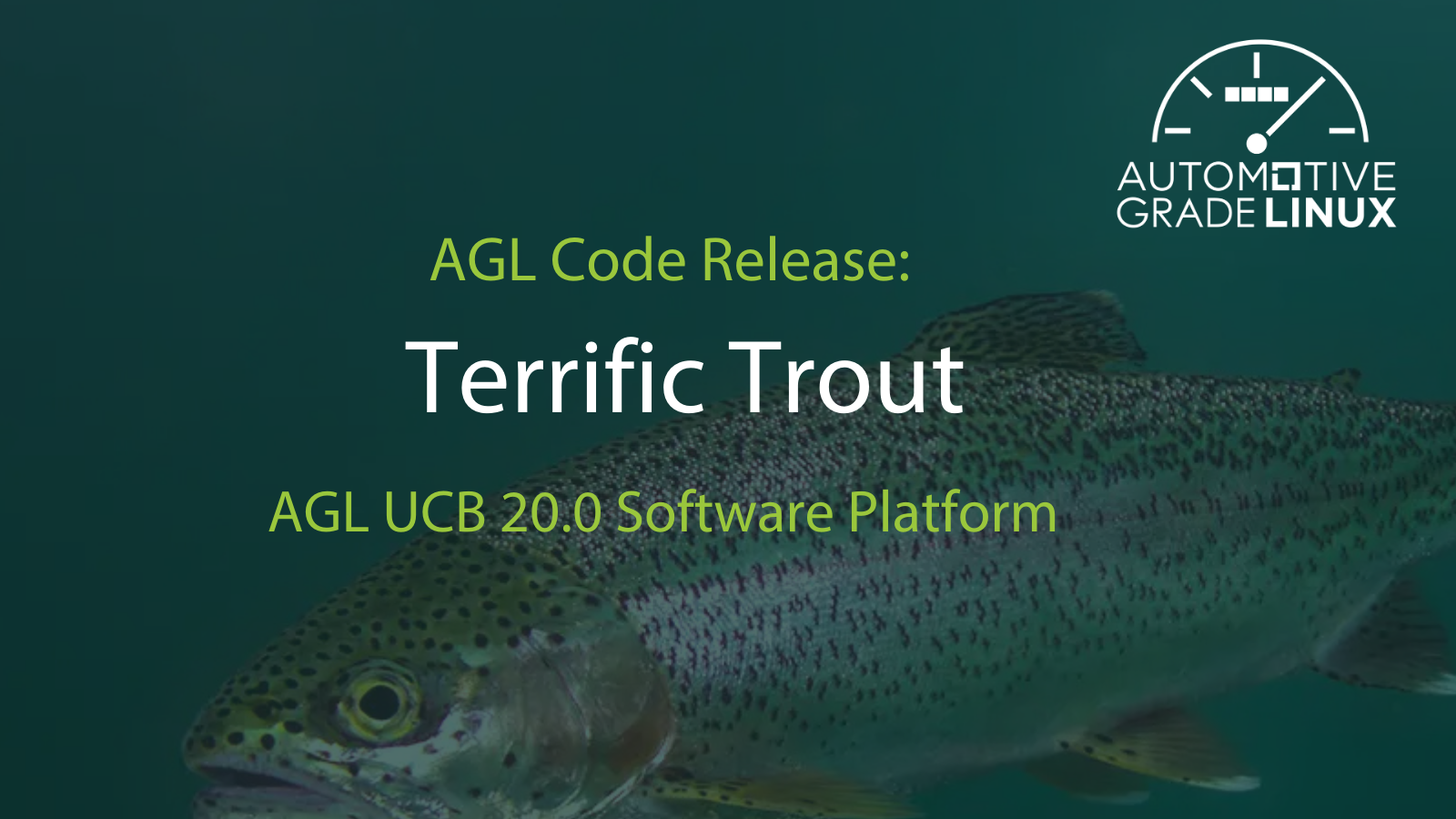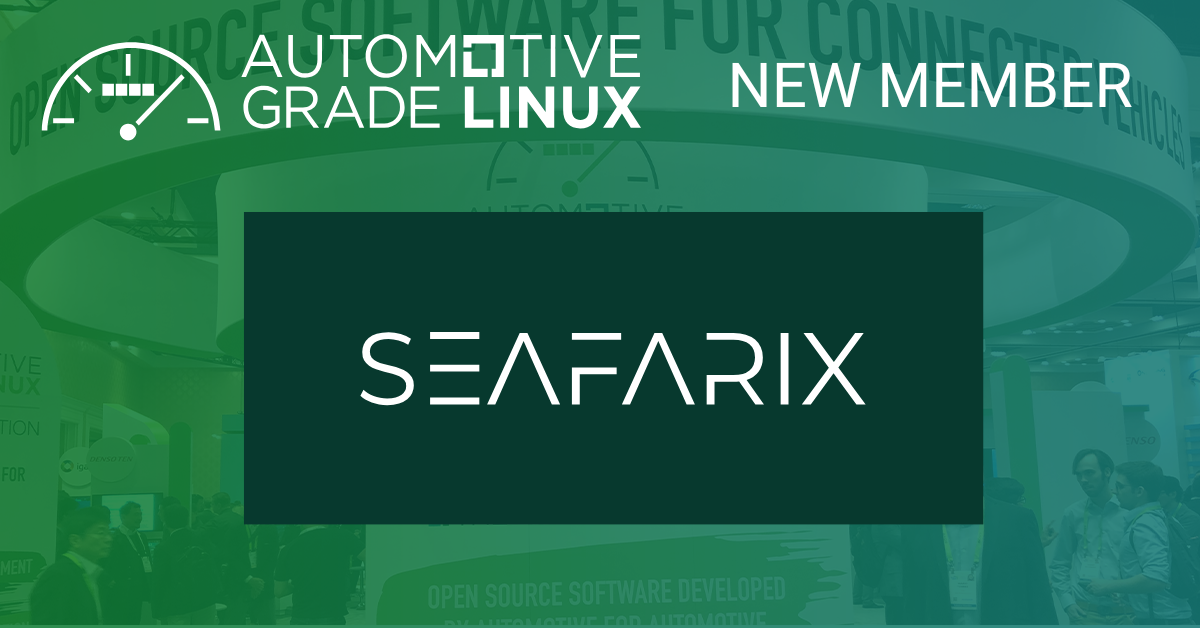Latest version of infotainment platform includes rear seat display, video playback, audio routing and application framework
SAN FRANCISCO, July 12, 2016 – Automotive Grade Linux (AGL), a collaborative open source project developing a Linux-based, open platform for the connected car, today announced the release of AGL Unified Code Base (UCB) 2.0. Built from the ground up through a joint effort by automakers and suppliers, the AGL UCB is an In-Vehicle-Infotainment (IVI) platform that can serve as the de facto standard for the industry.
The latest version of the Linux distribution includes new features such as audio routing and rear seat display. Ideal for deploying navigation, communications, safety, security and infotainment functionality, the AGL UCB distribution is supported by a broad community of participants with significant contributions from AGL members.
“The automotive industry is starting to embrace an open innovation mindset, and OEMs and suppliers are realizing that collaboration and joint development benefit the entire industry,” said Dan Cauchy, General Manager of Automotive at The Linux Foundation. “The AGL UCB provides the industry with a single, shared platform that will ultimately reduce fragmentation, improve time-to-market and reduce the cost of software development for everyone.”
Several members of AGL, including Toyota, Aisin AW, DENSO, Fujitsu Ten, HARMAN, Panasonic, Pioneer and Renesas Electronics are planning to use the AGL Unified Code Base distribution to deliver a modern in-vehicle infotainment and connected car experience for consumers.
“The latest version of the AGL UCB distribution marks a significant step toward building a developer ecosystem around the platform,” said Masashige Mizuyama, CTO, Infotainment Business, Panasonic. “The new platform enables developers to build and test one application that can be supported by multiple OEMs, instead of having to build multiple applications with the same function.”
Although initially focused on In-Vehicle-Infotainment (IVI), AGL plans to support instrument cluster, heads up display, telematics and autonomous driving in the future.
New AGL Unified Code Base 2.0 Features
Based on the Yocto Project, a complete embedded Linux development environment with tools, metadata, and documentation, the new AGL distribution includes:
- Rear seat display and video playback – controls video from the rear seat via touch screen; video on front display plays simultaneously as rear seat
- Audio routing and mixing – combines the best of GENIVI and Tizen audio management enabling streamlined audio management, audio prioritization and audio layering
- Application framework – controls and manages installing, running and updating applications; provides a more secure environment by assigning resources only to approved applications
- ConnMan network management – for pairing multiple Bluetooth devices and switching data connections between Bluetooth and WiFi
- Vehicle bus messaging – rewritten with built-in security to prevent unwanted intrusions; rogue applications will not be allowed to talk to the vehicle bus
- New build environment – faster server lets developers specify what goes into the build and submit custom jobs
- New test infrastructure – developers can remotely connect to a hardware board from anywhere in the world to perform testing
- New hardware board support – NXP Sabre Automotive, NXP WandBoard, Qualcomm DragonBoard, TI Vayu EVM and Raspberry Pi; continued support for Renesas R-CAR M2 PORTER and R-CAR E2 Silk, Intel boards including the MinnowBoard MAX and QEMU x86 64-bit emulation
The AGL Unified Code Base distribution, which is hosted by Linux Foundation and open to anyone, is available for download here.
More than 30 new companies have joined AGL in the past year, bringing the member total to more than 70. Ford, Honda, Jaguar Land Rover, Mazda, Mitsubishi Motors, Nissan, Subaru and Toyota are among the first carmakers to participate in the AGL collaborative project. Other members include Aisin AW, Continental, DENSO, Fujitsu Ten, HARMAN, Irdeto, Mitsubishi Electric, NTT DATA MSE, Panasonic, Pioneer, Qualcomm, Renesas Electronics, Wind River and many others.
AGL Demonstration at Automotive Linux Summit
The AGL UCB 2.0 will be featured at the Automotive Linux Summit (ALS) on July 13-14 in Tokyo, Japan. Demo applications for rear seat display, video playback, AM/FM radio, wheel input device, navigation, HVAC control, media player and browser, settings and home screen are on display.
AGL members ADIT, DENSO, Hitachi, IoT.bzh, Konsulko Group, Mazda, Mentor Graphics, Microchip Technology, NTT DATA MSE, NXP, Panasonic, Pioneer, The Qt Company, Renesas Electronics, Texas Instruments and Toyota contributed to the demo.
About Automotive Grade Linux (AGL)
Automotive Grade Linux is a collaborative open source project that aims to accelerate the development and adoption of a fully open software stack for the connected car. Leveraging the power and strength of Linux at its core, AGL is uniting automakers and technology companies to develop an open platform that offers OEMs complete control of the user experience so the industry can rapidly innovate where it counts. The AGL platform is available to all, and anyone can participate in its development. Learn more: https://www.automotivelinux.org/
Automotive Grade Linux is a Collaborative Project at The Linux Foundation. Linux Foundation Collaborative Projects are independently funded software projects that harness the power of collaborative development to fuel innovation across industries and ecosystems. www.linuxfoundation.org
Additional Resources
Media Inquiries
Emily Olin
Automotive Grade Linux



